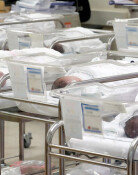Investment guru advises MBA students to study agriculture
Investment guru advises MBA students to study agriculture
Posted December. 06, 2014 08:18,
Legendary investor Jim Rogers on Thursday advised Master of Business Administration (MBA) students at Seoul National University to quit the MBA program and study agriculture. He argued that by the time the students would retire, agriculture would become the most promising industry. Rogers advised the students to have a switch of ideas and become farmers at a time when everyone else is neglecting agriculture and rush to cities. When the investment guru said he hoped to live as a farmer in China rather than a financier in America in his next life, it sounded like a prediction that there are promising chances to make money from agriculture from an investor`s viewpoint, rather than an expression of his personal dream of life on the farm.
The South Korea-China free trade agreement (FTA) has caused major concerns for rural communities. There are growing voices from farmers opposing the opening of the local rice market to Chinese imports. Rogers probably did not mean to advise retirees to go to rural villages and do farming. He called on younger generations to consider agriculture as a future growth industry and open up new markets by pioneering globally competitive farming sectors. To that end, universities should carry out systematic studies for a scientific agricultural industry and seek a breakthrough.
The Seoul-Beijing FTA is a golden opportunity for Korea to target 100 million wealthy Chinese consumers. Anxious about harmful foodstuffs in China, the high-income Chinese consumers are willing to buy Korea`s safe and organic farming products at high prices. They are increasingly concerned about Chinese agricultural products, which include fake food such as liquor, milk and even eggs.
Farmers who graduated from the state-run Korea National College of Agriculture and Fisheries had an average income of 65 million won (58,295 U.S. dollars) in 2010, about 40 percent higher than that of urban workers. This suggests that those who properly run livestock, flower, fruit or vegetable farms can be far better off than average workers in cities. Just as Rogers said, younger generations should change their way of thinking, and the government needs to come up with ground-breaking measures to encourage young people to taking on farming as a blue-ocean industry.
Headline News
- N. Korea launches cyberattacks on S. Korea's defense companies
- Major university hospital professors consider a day off each week
- Italy suffers from fiscal deficits from ‘Super Bonus’ scheme
- Inter Milan secures 20th Serie A title, surpassing AC Milan
- Ruling and opposition prioritize spending amid tax revenue shortfalls







